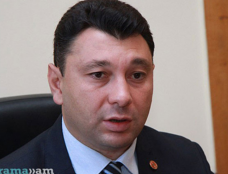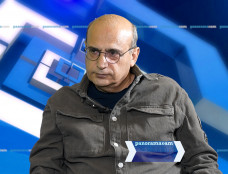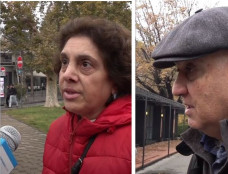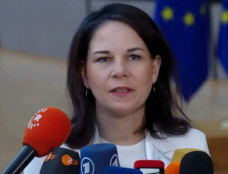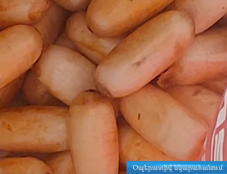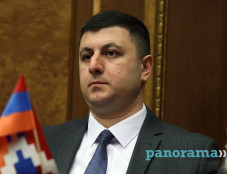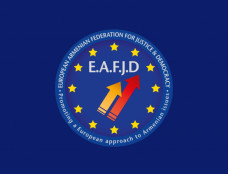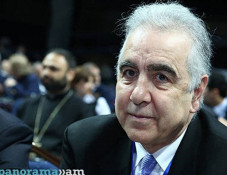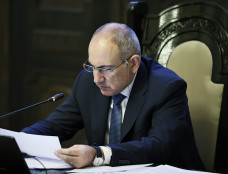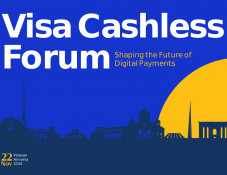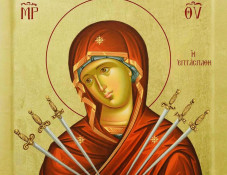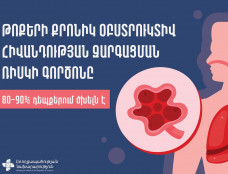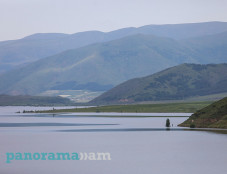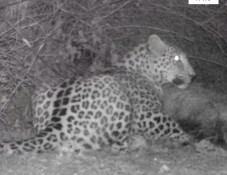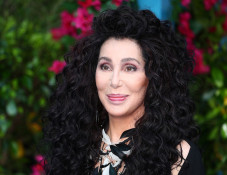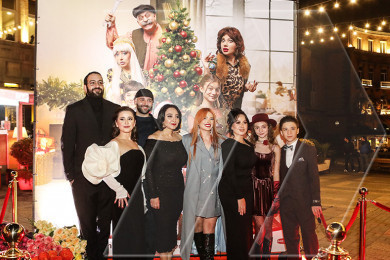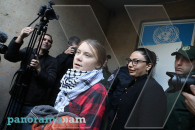
Italian Ambassador to Armenia: We have entered into a new season of our bilateral relations
Panorama.am’s interview with H.E. Mr. Vincenzo Del Monaco, Ambassador Extraordinary and Plenipotentiary of Italy to Armenia, about Armenian-Italian relations, tourism, regional developments, EU-Armenia relations, football, Christmas and other important topics.
Question: Mr. Ambassador, how do you feel in Armenia?
Answer: I feel like home in your country. I recognized many similarities between your country and my country. I consider Yerevan a very hospitable capital city, where life is easy and it’s very easy and safe even for families. So, I find myself at ease and home.
Question: They say Armenians and Italians share some kind of similar temperament. Is it true from your point of view?
Answer: I wish I could know each and every Armenian and each and every Italian. Italy is a small country, but Italians are very different from the Alps to Sicily. But, yes, I recognized common features between the Armenians and Italians – the spirit of the family, predominantly Christian countries, hospitable people, very generous, and also the love for kids.
.jpg)
Question: Last month Prime Minister Nikol Pashinyan visited Italy and had meetings with high-level officials. How would you describe Armenia-Italy relations?
Answer: Yes, exactly. Prime Minister Nikol Pashinyan paid his first official visit in Italy, and it was a very successful one.
These sorts of top-level visits compel us to look backward as well as forward. And my assessment is that we have entered into a new season of our bilateral relations. Our leaders have successfully brought the political dialogue to an upper level, we have intensified our economic and commercial relations, we are registering an unprecedented dynamism in our cultural relations, we have started almost from scratch our scientific cooperation, we are fruitfully cooperating in the field of rule of law, and I could easily continue with the list of pluses...
This summer an Armenian-ltalian business forum was held in Armenia attended by Italian companies. Among questions there had been discussions about regional initiatives, renewable energy, waste recycling and circulation, urban transport, the North-South Road Corridor.
Question: During these months, have some initiatives been started or implemented. Which fields of economy in Armenia is more attractive to investments?
Answer: As you said, in June we held a business forum, actually the first ever organized here in Armenia with Italian companies and the first business forum organized with a foreign country since the velvet revolution. The idea was to identify and focus on a limited number of critical sectors and dig deep into them, and that’s precisely what happened.
The business forum allowed to take stock of the full support of your Authorities when it comes to market access and foreign direct investments and it shed light on the opportunities offered by the Armenian market. As a matter of fact, in November last three Italo-Armenian joint ventures were established in Yerevan: one in the field of textile, one in the field of ceramics and a third one in the very promising telecom sector. Moreover, we have ongoing discussions on other projects in the field of infrastructures.
Let me add that also the business forum organized in Milan during the visit of Prime Minister was very successful, with more than 500 participants and I am already receiving emails from those who are willing to come on a business trip to Armenia.
Italy is the second largest trading partner of Armenia at EU level after Germany, but to make the case for our relations we should neither overpromise, nor underdeliver. We should rather stay focused on our priorities and continue doing our best.

Question: Italy is one of the most popular tourist destinations for Armenians. From January there will be direct flights from Yerevan to Rome and Milan operated by Ryanair. What are the statistics on Italian visits to Armenia and direct flights, what do you think, will affect those figures?
Answer: I am very glad that the heart of many Armenians is beating for Italy, as it is true the other way round. I very much look forward the opening of directs flights to Italy starting from January 14th. Let me share with you that this was one of the priorities that was constantly brought to my attention since I took office here in Yerevan, and I am glad to acknowledge that we have delivered. As was recognized by Prime Minister during his visit to Italy, the fact that Ryanair has decided to start operating from Rome and Milan is not accidental, but it testifies to the strength of the Italian market, in terms of potential tourist flows and business opportunities. I expect a very positive effect from the opening of those flights, a sort of game changer. It will certainly boost the number of Italians visiting Armenia. Let's leave it to the animal spirits of our respective entrepreneurs to promote tourism.
Then, I suggest that we meet again in a year time to assess together the percentage of increase in the incoming and outgoing flows.
Question: Recently we marked the 2nd year of signing the Comprehensive and Enhanced Partnership Agreement between Armenia and the EU. The primary expectation of ordinary citizens from this agreement is visa liberalization with the European Union. What is the Italy's position on visa liberalization with Armenia?
Answer: The signature and the subsequent entry into force of CEPA are milestones in the relations between the EU and Armenia. And let me underline that I strongly believe in the complementarity between the bilateral relations Italy-Armenia and those between the EU and Armenia.
My understanding is in fact that Armenians attach a very strong importance to the cooperation with the EU in the field of rule of law, in the fight against corruption and the reforms in the judiciary sector. If you allow me a metaphor, we should focus more on the arteries of the EU-Armenia relations, than on its capillaries.
On your specific question related to the high-level dialogue on visa liberalization, as you know the decision is a collective one in Brussels, at EU Level. Italy is playing an active role in the discussion together with our EU partners, and it is not a mystery that we are positively oriented to start the Dialogue.

Question: Last week the foreign ministers of Armenia and Azerbaijan met in Bratislava in the framework of the OSCE Ministerial Council. How do you see the prospects of the peace process?
Answer: As is well known, Italy has a traditionally balanced position on the Nagorno-Karabakh crisis. We support the work of the Co-Chairs of the Minsk Group and we encourage the parties to reach a mutually acceptable solution to it. We welcome every meeting between the parties, whether that was in Milan last year under our OSCE Chairmanship, in New York on the margins of the General Assembly meeting, in Bratislava few days ago and in any other capital.
The populations have to be prepared to the dividends of peace. Humanitarian and confidence building measures are also key steps.
No crisis has an easy solution, but every crisis has a solution provided that there is a political will to get to it and that the parties are ready to accept a compromise. I come from a Continent whose history was punctuated by horrible conflicts, and look where we are now.
The point is that only peace is holy, and I want to stress it now, especially these days, in the run-up to Christmas.
So, my genuine hope is that the new year will bring concrete results in the negotiations. My message to the leaders is that "one of life’s greatest fortune is the chance to work hard at work worth doing it".
Question: The next question concerns the illegal adoption of children from Armenia to Italy. Do you have any information on this?
Answer: This is a very sensitive topic. When I read it in the news, I immediately informed my capital. They immediately organized meetings with the Italian and Armenian counterpart, the associations working in the field of adoptions. As far as we know from the Italian side there were zero irregularities. The associations that worked and continue working with Armenians are fully reliable. So, we are eager to understand more and better from the Armenian side where the problem eventually lies, because from our side the procedures have been respected and, again, these associations are particularly reliable.
Question: In one of his recent interviews, President Macron stressed the importance of dialogue with Russia. What is Italy's position on development of relations between Russia and Europe?
Answer: I salute the recent declarations of President Macron. Dialogue is always fundamental to understand each other, to overcome difficulties and to work together at a better future. Italy has traditionally maintained good relations with Russia, we hold regular high level meetings, we are economic partners and we cherish our cultural exchanges. This is the spirit that we constantly bring to the debate with our partners on the relations with Moscow.
Question: Turkey’s recent military actions in North-East Syria have triggered hot debates among NATO allies and EU member states. What is Italy's position in this context?
Answer: Of course the Turkish operation has triggered debates, but we have to be very clear on one point: the Turkish operation Spring Peace is not a NATO operation.
Italy's position is also clear. We do not believe that unilateral initiatives and military solutions pay-off. We are contributing to the anti-Daesh coalition and we doubt that unilateral initiatives reinforce the common fight against terrorism.
More in general, Turkey is an important interlocutor in the Southern flank of Europe, an area of deep instability.
.jpg)
Question: Migration is a real challenge for Italy and for the solidarity of European countries. How does Italy manage to deal with this problem taking into account the issue of human rights of migrants and social tensions that migration brings to host countries?
Answer: Migration is indeed a challenge for Italy and for the rest of Europe. Over the last ten years my country has opened the doors to millions of migrants, the navy and the coast guard have rescued hundreds of thousands of them, day and night, we have been the lighthouse of Europe even in terms of values and human rights, but it clear that we cannot face this challenge alone.
I believe that the awareness about the challenge that major migration flows bring to our societies has been clearly caught even beyond the Alps and solidarity is now at the menu, in parallel with responsibility.
Question: The next question concerns the illegal adoption of children from Armenia to Italy. Do you have any information on this?
Answer: This is a very sensitive topic. When I read it in the news, I immediately informed my capital. They immediately organized meetings with the Italian and Armenian counterpart, the associations working in the field of adoptions. As far as we know from the Italian side there were zero irregularities. The associations that worked and continue working with Armenians are fully reliable. So, we are eager to understand more and better from the Armenian side where the problem eventually lies, because from our side the procedures have been respected and, again, these associations are particularly reliable.
Question: Coming to the football, you know that Armenians support mainly the football club where Henrikh Mkhitaryan plays. And now we are the fan of Roma. I would like to know what’s your favorite football club?
Answer: I will never answer your question, because at some point I need to go back to my home country, Rome. You know, it’s very-very kind because Mkhitaryan paid me a visit the same day he took the flight to go to Rome. He said, “Mr. Ambassador, I am happy to receive the welcome from your embassy.”
That was the only day in my diplomatic career when I was watered by phone calls and requests for interviews from the fans of A. S. Roma. And they asked me, “Are you a supporter of Roma, since you were born in Rome?” I said, “You know I am the follower of football because I am interested in all the major social phenomenon, but let me confess that I am not an expert of football.”
Question: Don’t you have one that you prefer more?
Answer: I need a lawyer to answer your question.
Question: I just can’t escape the question about the football match between Armenia and Italy that ended in 9-1 and became a source of memes and humor. How did you feel coming the next day to work?
Answer: Thanks God, my residence and the office are one next to the other. So, I didn’t go for a walk in the downtown and remained inside my ‘fortress’.
.jpg)
Question: Mr. Ambassador, it’s Christmas soon, where are you planning to celebrate it – in Armenia or in your home country?
Answer: In my family we celebrate Christmas wherever we are. Christmas is on 24-25 December, but it’s also an approach to life. We celebrate it regardless of the place where we physically are. This year we won’t be in Armenia, unfortunately, because of family reasons we gather in the old continent [Europe].
Question: Can you name the most popular, traditional meal for Christmas put on the table on that day?
Answer: You know, I may be confused when answering to your question, because we have several traditions in Italy. My father is originally from the south of Italy, my mother is originally from the north of Italy, and the traditions are slightly different. Sometime I saw fish appearing on my table, and other days I saw tortellini appearing on the table. Then I very happily married to a Belgian lady, and I see birds on the table – turkey with walnuts, foie gras. We have a kind of very European, continental traditions now, but the most important tradition is to sit around the same table and cherish the very spirit of that day.
Question: And the last question, Mr. Ambassador, what would you like to wish to our people on New Year?
Answer: Of course, happiness, prosperity and peace.
.jpg)
Interview by Anna Mkrtchyan
Photos by Lilian Galstyan
Newsfeed
Videos





